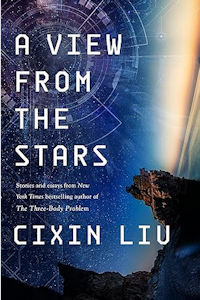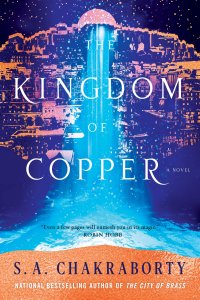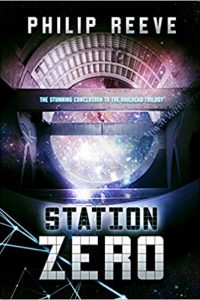Paul Di Filippo Reviews A View from the Stars by Cixin Liu
 A View from the Stars, Cixin Liu (Tor 978-1250292117, hardcover, 224pp, $27.99) April 2024
A View from the Stars, Cixin Liu (Tor 978-1250292117, hardcover, 224pp, $27.99) April 2024
Most authors segregate their fiction from their non-fiction, compiling the two classes of work into separate collections. I always recall one exception I read as a teen, a minor Frederik Pohl volume titled Digits & Dastards, which featured two essays along with the stories. And I suppose that Harlan Ellison’s inclusion of long anecdotal introductions in many of his books might represent some type of blending of “fact” and fiction. There’s also that category of anthology intended for the classroom, where stories sit cheek by jowl with critical pieces. And occasionally one gets a rarity like Margulies and Friend’s My Best Science Fiction Story, wherein each entry was accompanied by an author essay reflecting critically on his choice.
But Cixin Liu’s new assemblage is a horse of a different color, being roughly fifty percent fiction and an equal amount of non-fiction. It proves to be an entertaining and fruitful mix. It’s not that each story somehow exemplifies in textbook fashion the theoretical matters discussed in the adjacent pieces. But one does appreciate the fiction more, when one gets a sense of where Liu is coming from.
That said, I think this collection does not exist at quite the same summit as his previous one, 2020’s To Hold Up the Sky. (My Locus review here.). The stories are all older ones, which were extant for inclusion in Sky, but omitted for one reason or another. They amuse, but do not represent the heights of his writing, save perhaps for the final one. Even so, there’s much to admire when they are considered en masse.
And once more, the bevy of deft translators earn our loudest applause.
We start with “Time Enough for Love”. Just the respectful use of the title of one of Heinlein’s most maligned books is indicative of a non-Anglo slant on the field, a perspective that holds different estimates of value than the Western consensus. This is a charming bit of autobiography, showing Liu’s childhood start to his love affair with SF.
“Whale Song” is a Ruckeresque or Scalzian tale about a crime boss, a mad scientist, and a cybernetic whale. Sprightly and fun.
More informative autobiographical details emerge from “A Journey in Search of Home: On the Inclusion of ‘The Wandering Earth’ in the 30th Anniversary of Science Fiction World”. Liu exhibits a trademark humility and sense of respect for his well-earned status.
“The Messenger” finds a world-weary Albert Einstein comforted by a visitor from the future, bearing a magical violin and the assurance that “Humanity has a future.” The story has a Kessel-like flavor.
In “Thirty Years of Making Magic Out of Ordinariness: Celebrating Science Fiction World’s Thirtieth Anniversary”, Liu weaves personal reminiscences again into his tribute to an important Chinese zine. Most of these pieces deliver intriguing pronouncements on the nature of SF, such as this one:
In truth, whether we’re talking about science fiction across the globe or in China, it’s far too early to get nostalgic. Even to an individual, thirty years is hardly a slog; the glories and obstacles of the past are just a speck compared to the vastness of the future. Nostalgia ages people, but science fiction is a literature of youth. Its spirit is the youthful yearning for new worlds, and new ways of living. Mainstream literature is like Chinese baijiu, tasting better as it ages; science fiction, on the other hand, is like tap beer—you’ve got to drink it quick. Read today, even sci-fi classics seem feeble, not revelatory. The nature of science fiction is to shine brightest in the present, then to be quickly forgotten. But science fiction shouldn’t be afraid of obsolescence. As a literature of innovation, it uses a constant stream of inventions and shocks to hold back obsolescence, like an everlasting fire. Just as ash falls, the flame springs back to life, emitting dazzling light. To accomplish this, it must hold on to its youthfulness. Only tonight can we permit ourselves a moment of nostalgia. Tomorrow morning, we ought to try and return to a child’s way of seeing things, and face that future of infinite possibilities that only children possess.
The discovery of impactful loci of power, where a simple effort can wreak vast results, is the engine of “Butterfly”. Placing this extrapolation amidst the Balkan wars of the 1990s adds suspense and emotion to the novum.
Combining the themes of environmentalism, space travel, hyper-engineering and history, “One and One Hundred Thousand Earths” is a Heinleinesque paean to mankind’s off-planet destiny.
Moving beyond merely commemorating his own work in “On Finishing Death’s End, the Last Book in the Remembrance of Earth’s Past Trilogy”, Liu makes a keen observation that might explain the current state of disinterest in SF.
Of all the unexpected things that might interrupt Chinese science fiction’s development, social unrest has to be the most worrying. I once told readers at a conference that science fiction is the product of leisurely and carefree minds. No one agreed, but I was telling the truth. Only when our lives are stable and quiet can we allow the universe’s catastrophes to fascinate and awe us. If we already live in an environment full of danger, then science fiction won’t interest us.
In the spirit of Greg Benford, Liu anatomizes “The Battle Between Sci-Fi and Fantasy”, arriving at hopes for a détente that is mutually beneficial. “Chinese science fiction lacks religious feeling.” Following this thread in “The ‘Church’ of Sci-Fi: On Depictions of the Universe in Science Fiction”, Liu delves into territory familiar from the work of the Panshins on transcendence.
Greg Egan comes to mind in “End of the Microcosmos”, a tale wherein high-energy physics threatens to unravel the fabric of spacetime.
“Poetic Science Fiction” is an examination and extolling of the fiction of Ken Liu, Cixin’s namesake “brother from another mother.”
The spirit of Stapledon hovers over the far-future speculations in “Civilization’s Expansion in Reverse”.
Space travelers find themselves cast adrift in time in “Destiny”, and end up marooned on an alternate Earth which is lightly but convincingly sketched.
Readers familiar with the notions of a hostile universe depicted in Pelligrino and Zebrowski’s The Killing Star, will find further shivers in the same line of scientific logic contained in “The Dark Forest Theory”.
Liu’s wide-ranging forecasts in “The World in Fifty Years” brought to my mind many of Charles Stross’s famous blog posts that consider extremely practical aspects of technology and society in unorthodox ways.
Our last piece of fiction is the longest, and most vibrant and complex. “Heard It in the Morning” is a Clarkean accelerando. Human progress is interrupted by the arrival of a godlike alien who calls himself “the dehazardification officer of this universe.” The consequent changes to Earth and humanity cascade violently.
We finish up with “On Ball Lightning, An Interview with Liu Cixin” and “We’re Sci-Fi Fans”. The latter reveals that the motto “Fans are slans” has legs long enough to cross the Pacific.
As with the work of Stanislaw Lem and the Strugatsky Brothers, Cixin Liu’s writings offer a rich and deep SF-centric worldview whose exoticisms are precisely balanced by the universal commonalities which all SF readers and writers share across the globe.
 While you are here, please take a moment to support Locus with a one-time or recurring donation. We rely on reader donations to keep the magazine and site going, and would like to keep the site paywall free, but WE NEED YOUR FINANCIAL SUPPORT to continue quality coverage of the science fiction and fantasy field.
While you are here, please take a moment to support Locus with a one-time or recurring donation. We rely on reader donations to keep the magazine and site going, and would like to keep the site paywall free, but WE NEED YOUR FINANCIAL SUPPORT to continue quality coverage of the science fiction and fantasy field.
©Locus Magazine. Copyrighted material may not be republished without permission of LSFF.







